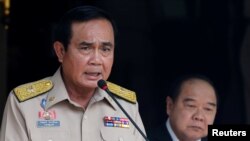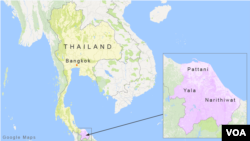Thai police investigators say up to 20 people were involved in last Friday’s bomb attacks, but the identity of the culprits is a topic of intense speculation.
Police sources tell VOA at least seven people have been detained for questioning about the attacks on tourist hot spots that left more than 30 dead or injured.
The Thai military junta, the National Council for Peace and Order (NCPO) says politicians opposed to the military-led government were behind the attacks that came as the country marked the Thai queen’s birthday, a national holiday.
But political parties, including the Pheu Thai Party, deposed in the May 2014 coup, and its supporters, the United Front for Democracy against Dictatorship (UDD), have denied links to the bombings.
The attacks came less than a week after Thais voted to support a military-backed constitution that is expected to lead to new elections next year.
The new charter will curb the roles of the leading political parties, including the Pheu Thai and Democrat parties, as well as extend the military’s powers for at least for five years.
Out of place
The attacks hit southern provincial regions that have been largely free from the past dozen years of insurgent violence that has affected and remained largely within the borders of the three largely Muslim border provinces of Pattani, Yala and Narithiwat.
The insurgency, seeking autonomy from the Thai state, has left more than 6,000 dead and thousands injured since it reignited in 2004.
The attacks Thursday and Friday hit the southern provinces of Trang, Krabi, Phuket, Phangnga, Nakhon Si Thammarat, Surat Thani and Prachuap Khiri Khan, where the Thai royal family has a residence in the seaside town of Hua Hin, the site of several bombings.
Thai authorities have sought the assistance of neighboring Malaysia, the source of the mobile phones used to detonate the bombs. The Barisan National Revolutionary insurgent movement, and other groups in the Southern border provinces, also travel and receive support from groups in Malaysia, security analysts said.
The investigations comes as Thai prime minister and junta leader, Prayut Chan-o-cha, is due to visit Malaysia this week for discussions with Prime Minister Najib Razak, including talks on the bombing investigations.
Senior Thai Police Chief Pongspat Pongcharoen told local media he did not believe the attacks were linked to the southern border provinces’ insurgency.
But Assistant National Police Chief Suchart Theerasawaat said the bombs used in at least three of the attacks were similar to those found previously in the southern border provinces.
A senior member of Islamic Yala Council, Nimu Makache, told VOA the bombings gave an appearance the insurgency was spreading outside the three southern border provinces, but instead he said it was groups “opposing or disliking the military government, so it is more likely political.” He denied the Barisan National Revolutionary movement was directly involved in the attacks.
But a Thai analyst with close links to government authorities told VOA on the condition of anonymity the investigations have shown the incendiary bombs were linked to BRN.
“It is quite clear that these are BRN made bombs. But the thing is, what we cannot crack is, whether this [was] for the institutional objectives of BRN (to expand the insurgency) or BRN is collaborating with other elements in Thai domestic politics,” the analyst said.
Timing the message
The analyst said it appeared by bombing on the Thai queen’s birthday holiday the BRN was looking to achieve its traditional objective of pressing the government in its campaign for the border provinces’ autonomy, “plus feed into the domestic politics as well.”
He said the timing of the bombings an hour after religious ceremonies led to fewer injuries.
“It was a message. They could have made it deadlier,’ when crowds of well-wishers had gathered. “But they waited until after the national anthem ... most attendees had already left”.
Analysts say there are parallels with a 2006 bombing campaign during the New Year’s Holiday, when nine bombs shattered celebrations and left two people dead and more than 30 wounded.
The attacks were linked to supporters of Prime Minister Thaksin Shinawatra, ousted in a September 2006 coup, and were aimed at discrediting the then military-led government.
Angkhana Neelapaichit, a member of the National Human Rights Commission, called on the Thai military to step-up protection and investigations to prevent further violence.
“The intelligence agencies should work harder than this because they should receive some information that some place will be the focus of violence, so they can give some warning to the people,” Angkhana said.
She called on Thai authorities to carry out transparent investigations and respect the legal and human rights of those detained by authorities.






